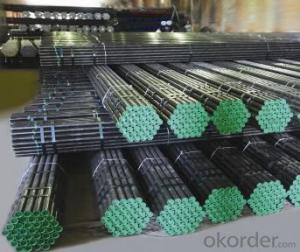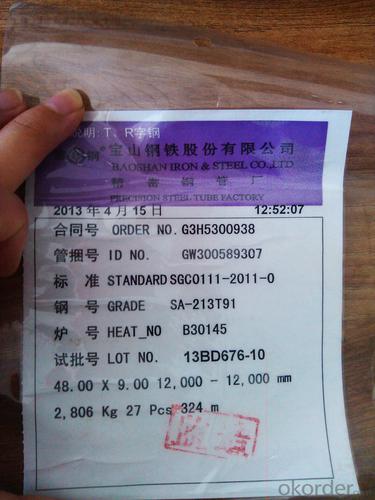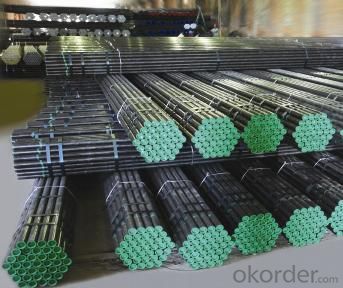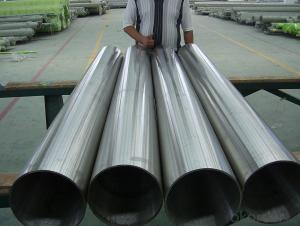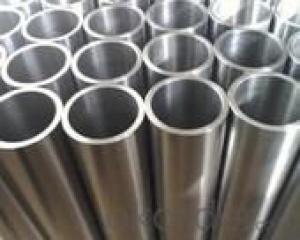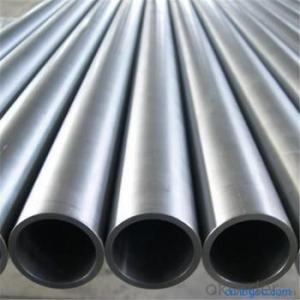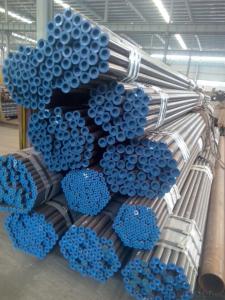ASTM A213 T91 boiler tube
- Loading Port:
- Shanghai
- Payment Terms:
- TT OR LC
- Min Order Qty:
- -
- Supply Capability:
- 30000 kg/month
OKorder Service Pledge
OKorder Financial Service
You Might Also Like
Alloy pipe stock grade A335P11/P22/P12/P91/P92/P9/P5 A213 T11/T22/T12/T91/T91/T9/T5
T91 alloy pipe is America national tree like ridge and America combustion new martensitic heat-resistant steel engineering company metallurgical materials laboratory research work. It is to reduce the carbon content of 9Cr1MoV steel on the basis of the content of sulphur, phosphorus, strictly limit the vanadium, niobium, adding small amount of alloying elements.
The number of K90901 T91 alloy tube
T91 alloy tube
T91 alloy pipe specifications: 8-1240 x 1-200mm
Overview of T91 alloy tube:
T91 alloy tubes for ferrite and Olympic alloy steel seamless steel tube boiler, overheating and heat exchanger belongs to (ASTM A213 / A213M-07a)
Use:
For low and medium pressure boiler (work pressure is generally not more than 5.88Mpa, the operating temperature at 450 DEG C) of the heating surface tube; used for high pressure boiler (work pressure is generally above 9.8Mpa, operate at a temperature of 450 DEG to 650 DEG C between) the heating surface tubes, economizer, superheater, reheater, petrochemical industrial pipe.
Heat treatment of T91 alloy tube:
The final heat of T91 treatment for normalizing and high temperature tempering, normalizing temperature 1040 C, the holding time of not less than 10 min, the tempering temperature is 730 to 780 DEG C, the heat preservation time is not less than 1h, the final heat treatment on Microstructure of tempered martensite
- Q: Can steel pipes be used for oil and gas well production?
- Yes, steel pipes can be used for oil and gas well production. Steel pipes are commonly used in the oil and gas industry due to their high strength and durability, which allows them to withstand the harsh conditions of drilling and production processes. Additionally, steel pipes can efficiently transport oil and gas over long distances, making them a preferred choice in the industry.
- Q: Does seamless steel tube have a bend of 135 degrees?
- Other name: 90 degree elbow, right angle bend, love bend, punching elbow, pressing elbow, mechanism bend, welding elbow, etc..Usage: connect two pipes with same nominal diameter or different pipe, make the pipe bend at 90, 45, 180 degrees and various degrees.Bending radius is less than or equal to 1.5 times the diameter of the elbow. It is 1.5 times larger than the pipe diameter and belongs to the elbow
- Q: Can steel pipes be used in extremely cold temperatures?
- Yes, steel pipes can be used in extremely cold temperatures. Steel is known for its strength and durability, making it suitable for various applications, including those in freezing conditions. However, it is important to note that steel contracts in cold temperatures, which may affect its dimensions and structural integrity. Therefore, proper insulation and precautions should be taken to prevent any potential issues such as cracking or leakage.
- Q: How are steel pipes tested for strength and durability?
- Steel pipes are tested for strength and durability through various methods, including destructive and non-destructive testing. Destructive testing involves subjecting the pipes to intense pressure or impact to determine their breaking point, while non-destructive testing methods, such as ultrasonic or magnetic particle testing, are used to detect any internal or surface defects that may compromise their strength and durability. These tests ensure that steel pipes meet the required standards and can withstand the intended usage conditions.
- Q: Can steel pipes be used for transporting drinking water?
- Indeed, steel pipes have the capacity to transport drinking water. These pipes are extensively employed in water distribution networks and have a long history of usage. Renowned for their robustness, potency, and ability to resist corrosion, steel pipes are highly favored. Nonetheless, it is imperative to ensure that steel pipes designated for drinking water transportation are adequately coated or lined in order to avert any potential contamination originating from the metal. Moreover, it is crucial to conduct routine inspections and maintenance to safeguard the pipes' integrity and to forestall any leaks or ruptures that could jeopardize the water's quality.
- Q: What are the different joining methods for steel pipes?
- There are several joining methods for steel pipes, including welding, threaded connections, flanged connections, and mechanical couplings. Welding involves melting the ends of the pipes and fusing them together using heat. Threaded connections involve screwing the pipes together using threaded ends. Flanged connections use flanges that are bolted together to connect the pipes. Mechanical couplings use a variety of methods such as compression fittings or grooved couplings to connect the pipes without welding or threading.
- Q: Can steel pipes be used for underground water supply networks?
- Yes, steel pipes can be used for underground water supply networks. Steel pipes are durable, resistant to corrosion, and have high strength, making them suitable for carrying water underground. Additionally, steel pipes can withstand high pressure and temperature variations, ensuring a reliable and long-lasting water supply system.
- Q: How long do steel pipes last?
- The lifespan of steel pipes can vary depending on several factors, including the quality of the steel used, the environment in which they are installed, and the maintenance and care given to them. Generally, steel pipes are known for their durability and longevity. With proper installation and regular maintenance, steel pipes can last for several decades, often exceeding 50 years. However, it is important to note that external factors such as corrosion, exposure to extreme temperatures, and chemical reactions can significantly affect their lifespan. Regular inspections, timely repairs, and protective coatings can help extend the life of steel pipes, ensuring their reliability and functionality for many years.
- Q: How are steel pipes used in the food and beverage industry?
- Steel pipes are commonly used in the food and beverage industry for various applications such as transporting liquids and gases, including water, beverages, and food ingredients. They are chosen for their durability, resistance to corrosion, and ability to maintain hygiene standards. Steel pipes are used to facilitate the flow of materials throughout the production process, ensuring safe and efficient operations in the food and beverage industry.
- Q: What quota is reserved for buried DN20 steel pipe?
- It is an embedded sleeve control sub item, if the reserved hole, then there is no need to cover, special subject structure adjustment factor of the cost of the water supply and drainage engineering, water supply and drainage engineering he is buried under the charge.
Send your message to us
ASTM A213 T91 boiler tube
- Loading Port:
- Shanghai
- Payment Terms:
- TT OR LC
- Min Order Qty:
- -
- Supply Capability:
- 30000 kg/month
OKorder Service Pledge
OKorder Financial Service
Similar products
Hot products
Hot Searches
Related keywords

